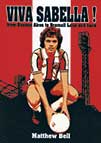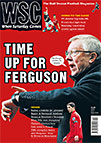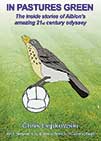 From Buenos Aires to Bramall Lane and back
From Buenos Aires to Bramall Lane and back
by Matthew Bell
ACM Retro, £12.95
Reviewed by Sam Kelly
From WSC 315 May 2013
Buy this book
Today, Alejandro Sabella wears an Argentinian FA baseball cap to work, and is probably the international football manager most people would like to take under their arm and cuddle. He wasn’t always a softly spoken, grandfather-like figure, though. In 1978, he was part of a transfer saga which transformed British football. Sabella’s move from River Plate, where he was a fringe player, to Sheffield United is less well known than those of Ricardo Villa and Osvaldo Ardiles to Tottenham Hotspur (from Racing and Huracán, respectively). Viva Sabella! tells the story of how Sheffield United manager Harry Haslam brokered the Spurs deals, while making sure to return from his post-World Cup trip to Argentina with a player of his own.
The book goes into rather more detail about the 1978 World Cup than it really needs to, as it does with Estudiantes de La Plata’s Copa Libertadores and Intercontinental Cup triumphs in the late 1960s (Sabella managed Estudiantes later in life, winning the Libertadores himself in 2009, but wasn’t connected to them at that time). Not all of the Argentinian sections are quite on song – the stadium in which the author claims Estudiantes played home matches in the late 1960s wasn’t opened until 2003 – and on a couple of occasions he attributes derisive interpretations to Argentinian nicknames for teams or people which are in
fact meant fondly.
Unfortunately, we can only guess as to why Haslam was happy to let Tottenham in on the Ardiles and Villa deals with seemingly nothing to gain for himself – clearly football in the late 1970s was a different world. Antonio Rattín, who had a fixer’s role in the transfers, is remembered exclusively in Britain for his red card against England during the 1966 World Cup. That makes it interesting to see him portrayed as the pleasant and charming gentleman he has a well-earned reputation for being in Argentina.
There are cameos from Carlos Bilardo, Don Revie and Juan Sebastián Verón among others and a good summary of Sabella’s playing time in England; he impressed on a personal level but his team-mates didn’t hit the same heights for Sheffield United and the club were relegated to Division Three in his first season. He then had a brief spell at Leeds United before returning to Argentina, where he played a few matches for the national team. Sabella’s life on his return home is well treated, especially his coaching and managerial career as assistant to Daniel Passarella at River Plate, Argentina and Uruguay, and his step up to the number-one spot first with Estudiantes and then as manager of Argentina.
Although Sabella’s name is in the title, and his face looks out from the cover, this isn’t really a book about him – it is more to do with the difficulties players can run into when moving to a new country and culture. It also as a testament to Harry Haslam, a man whose vision of the direction football was going in proved correct, even if it didn’t benefit his club.
Buy this book
 Trains are an important mode of transport for fans but Tom Hocking says that little is done to make them more convenient
Trains are an important mode of transport for fans but Tom Hocking says that little is done to make them more convenient From Buenos Aires to Bramall Lane and back
From Buenos Aires to Bramall Lane and back The inside stories of Albion’s amazing 21st century odyssey
The inside stories of Albion’s amazing 21st century odyssey